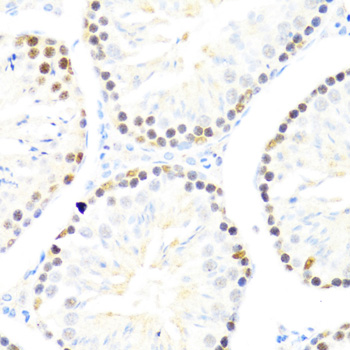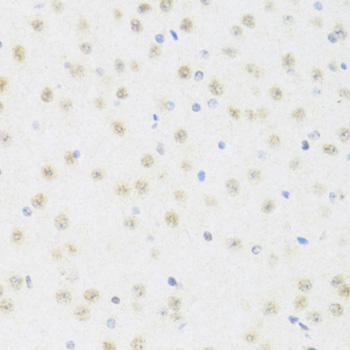Product Detail
Product NameDDX50 Rabbit Polyclonal Antibody
Host SpeciesRabbit
ClonalityPolyclonal
IsotypeIgG
PurificationAffinity purification
ApplicationsWB,IHC,IF
Species ReactivityHuman,Mouse,Rat
Immunogen DescRecombinant fusion protein of human DDX50 (NP_076950.1).
ConjugateUnconjugated
Other NamesDDX50;GU2;GUB;RH-II/GuB;mcdrh
Accession NoSwiss Prot:Q9BQ39
GeneID:79009
Uniprot
Q9BQ39
Calculated MW82kDa
Sdspage MW105kDa
FormulationBuffer: PBS with 0.02% sodium azide,50% glycerol,pH7.3.
StorageStore at -20˚C. Avoid freeze / thaw cycles.
Application Details
WB 1:200 - 1:2000
IHC 1:50 - 1:200
IF 1:50 - 1:200
Immunohistochemistry of paraffin-embedded mouse testis using DDX50 at dilution of 1:100 (40x lens).
Immunohistochemistry of paraffin-embedded mouse brain using DDX50 at dilution of 1:100 (40x lens).
Western blot analysis of extracts of various cell lines, using DDX50 at 1:3000 dilution.
Immunofluorescence analysis of C6 cells using DDX50 at dilution of 1:100. Blue: DAPI for nuclear staining.
Immunofluorescence analysis of NIH-3T3 cells using DDX50 at dilution of 1:100. Blue: DAPI for nuclear staining.
Immunofluorescence analysis of U-2 OS cells using DDX50 at dilution of 1:100. Blue: DAPI for nuclear staining.
DEAD box proteins, characterized by the conserved motif Asp-Glu-Ala-Asp (DEAD), are putative RNA helicases. They are implicated in a number of cellular processes involving alteration of RNA secondary structure such as translation initiation, nuclear and mitochondrial splicing, and ribosome and spliceosome assembly. Based on their distribution patterns, some members of this DEAD box protein family are believed to be involved in embryogenesis, spermatogenesis, and cellular growth and division. This gene encodes a DEAD box enzyme that may be involved in ribosomal RNA synthesis or processing. This gene and DDX21, also called RH-II/GuA, have similar genomic structures and are in tandem orientation on chromosome 10, suggesting that the two genes arose by gene duplication in evolution. This gene has pseudogenes on chromosomes 2, 3 and 4. Alternative splicing of this gene generates multiple transcript variants, but the full length nature of all the other variants but one has not been defined.
If you have published an article using product 55560, please notify us so that we can cite your literature.








 Yes
Yes



